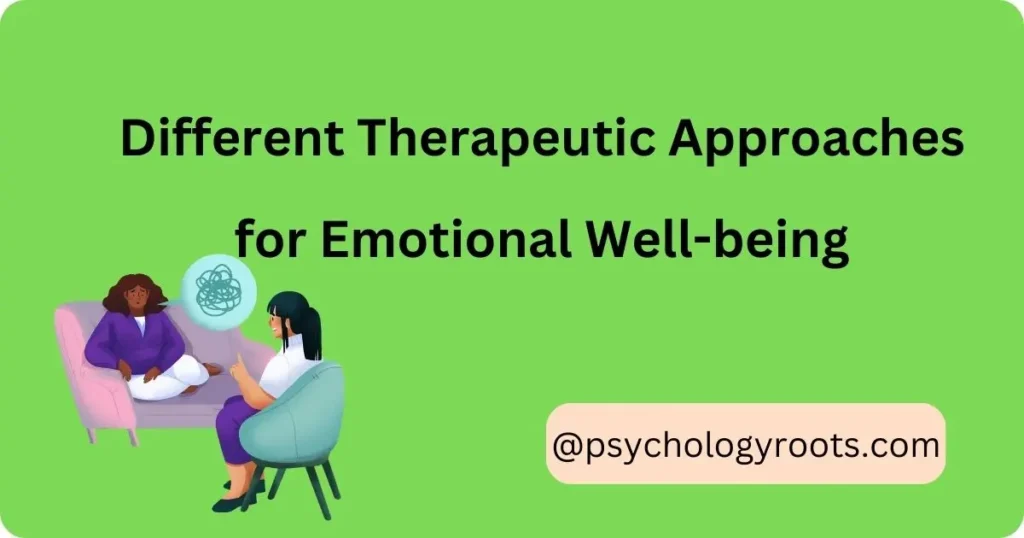Table of Contents
Different Therapeutic Approaches for Emotional Well-being
Here in this post, we are discussing “Different Therapeutic Approaches for Emotional Well-being”. You can read more about psychology-related material on our website. Keep visiting Psychology Roots.
Table of Contents
When individuals seek assistance for emotional well-being, they encounter a multitude of therapy options, each offering unique techniques and strategies to address diverse mental health concerns. Understanding the various types of therapy enables informed decision-making, allowing individuals to select the most suitable approach for their specific needs. This article provides a comprehensive exploration of common therapeutic modalities and their respective benefits.

Cognitive Behavioral Therapy (CBT):
Cognitive Behavioral Therapy, or CBT, is a widely recognized and empirically supported therapeutic modality. It centers on the interrelation between thoughts, emotions, and behaviors. By identifying negative cognitive patterns, individuals can learn to replace them with healthier and more constructive thoughts. CBT aims to foster the development of effective coping mechanisms and problem-solving skills. It is frequently employed in the treatment of anxiety disorders, depression, and addiction.
Psychodynamic Therapy:
Psychodynamic therapy delves into unconscious processes and unresolved conflicts that shape an individual’s thoughts and behaviors. By examining past experiences and relationships, individuals gain insight into present difficulties. This therapeutic approach places emphasis on the therapeutic relationship and the exploration of emotions. Psychodynamic therapy is particularly effective for individuals grappling with longstanding emotional challenges and relationship issues.
Person-Centered Therapy:
Person-centered therapy, also known as client-centered therapy, emphasizes the therapeutic relationship and the individual’s autonomy. The therapist creates a nonjudgmental and secure space for clients to explore their thoughts, emotions, and experiences. The primary objective is to facilitate self-discovery and personal growth. Person-centered therapy is especially beneficial for individuals seeking support for self-esteem concerns, identity exploration, and personal development.
Gestalt Therapy:
Gestalt therapy directs attention to the present moment and underscores self-awareness and personal responsibility. It encourages individuals to fully experience their thoughts, emotions, and sensations in the present. By integrating fragmented aspects of the self, individuals attain a more comprehensive understanding of their experiences. Gestalt therapy is frequently effective in addressing challenges related to self-expression, unresolved traumas, and interpersonal difficulties.
Family Systems Therapy:
Family systems therapy considers individuals within the context of their family unit and explores how family dynamics influence their well-being. It examines patterns of communication, roles, and relationships within the family system. The therapy aims to enhance understanding, improve communication, and establish healthy boundaries. Family systems therapy is instrumental in addressing family conflict, parent-child relationships, and familial trauma.
Mindfulness-Based Therapy:
Mindfulness-based therapy incorporates mindfulness practices to cultivate awareness and acceptance of the present moment. It involves developing non-judgmental attention and self-compassion. This therapeutic approach is effective in managing stress, anxiety, and depression. Moreover, it promotes overall well-being and fosters emotional resilience.
Conclusion:
Within the realm of therapy, a wide array of approaches exists to support individuals in their pursuit of emotional well-being. Cognitive Behavioral Therapy, Psychodynamic Therapy, Person-Centered Therapy, Gestalt Therapy, Family Systems Therapy, and Mindfulness-Based Therapy are just a few examples of the diverse therapeutic modalities available. By exploring these different types of therapy, individuals can identify the approach that resonates with them and effectively addresses their specific needs, ultimately facilitating personal growth and improved emotional health.
Help Us Improve This Article
Have you discovered an inaccuracy? We put out great effort to give accurate and scientifically trustworthy information to our readers. Please notify us if you discover any typographical or grammatical errors.
Make a comment. We acknowledge and appreciate your efforts.
If you have any scale or any material related to psychology kindly share it with us at psychologyroots@gmail.com. We help others on behalf of you.